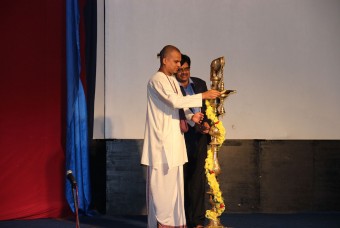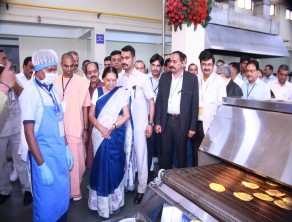Our Kitchens
The Akshaya Patra Foundation operates in 24 locations across 10 States in India
Centralised kitchens are large kitchen units that have the capacity to typically cook up to 100,000 meals. These kitchens serve a set of schools located around the unit. They are automated and thus ensure hygiene during the cooking processes. On the other hand, in locations where factors like difficult geographical terrain and improper road connectivity do not support construction of large infrastructure, the decentralised kitchen format is the ideal solution. These kitchens are run by the Women Self-Help Groups (SHGs) under the guidance and supervision of Akshaya Patra’s kitchen process and operations module.
Akshaya Patra Kitchens have adopted Six Sigma Methodologies
Cooking in the centralised units begins in the early morning. All kitchens run by the organisation follow a scheduled menu. All the centralised kitchens are equipped with cauldrons, trolleys, rice chutes, dal/sambar tanks, cutting boards, knives and other similar equipment that are sanitised before usage. The North Indian kitchens are equipped with rice cauldrons and dal cauldrons. Each rice cauldron has a capacity of at least 500 litres; and each dal cauldron has the capacity to cook 1,200 litres to 3,000 litres of dal. As roti is an integral part of the North Indian menu, the kitchens are equipped with roti making machines, which have the capacity to roll out up to 200,000 rotis from 6,000 kgs of wheat flour.
The South Indian kitchens are equipped with rice cauldrons and sambar cauldrons. Each rice cauldron has a capacity of at least 500 litres; each sambar cauldron has the capacity to cook 1,200 litres to 3,000 litres of sambar. All the vessels are of stainless steel 304 food grade material.
Quality Assurance during procurement of raw materials
The SQMS process covers sub processes like Supplier Selection, Supplier Qualification, Supplier Rating etc. to ensure that the right and best raw materials are procured. Our Quality Control process ensures that raw materials are accepted only after thorough Quality Inspection in order to meet all the requirements of our Raw Material Specifications, which is generally taken and adopted from Food Safety Standards Act 2006 (FSSA).
Storage, Handling, Preservation of raw materials
Fresh vegetables are procured on a daily basis. After procurement, sorting of vegetables is done to retain the best quality. All the vegetables are cleaned with potable water and sanitised before the cutting process. Cold storage is used to store ready-to-cook cut vegetables to retain freshness. Rice is supplied by the Food Corporation of India (FCI). Before the cooking process, the rice is machine-cleaned and washed thoroughly. In order to ensure all the raw materials are fresh, all the kitchens follow the FIFO (First In First Out)and FEFO (First Expiry First Out) methods while issuing the raw material for production.
By doing so, the kitchens are able to properly identify, store and retrieve the raw materials in an appropriate manner.
Quality and Safety during cooking
All the kitchens of Akshaya Patra follow a standard process for preparing the mid-day meals. This process is charted out to ensure hygiene and quality of the cooked meal and also to adhere to the food safety standards. All the cooking equipment like cauldrons, trolleys, rice chutes and sambar/dal tanks, cutting boards, knives etc. are sterilised using steam before the cooking process begins. The vessels used in the kitchens are made of stainless steel of 304 grade and is best for cooking and handling food.
The decentralised kitchen units are equipped with necessary cooking equipment like chapati pans, cooking vessels for rice and dal and vessels for transporting the cooked mid-day meals to the schools. Personal hygiene and Food Safety trainings are provided regularly to the kitchen staff to ensure hygiene standards are met.
All the kitchens have well trained Cooks and Production Supervisors to manage and supervise the production. Critical Control Points (CCPs) like cooking temperature are checked and recorded at periodic intervals to ensure the right quality of the meal.
To ensure food quality is maintained, Quality Check is done by the Quality Officers in each kitchen.
Food Packing and Transportation
The cooked food is packed in steam sterilised vessels. We use specially designed and customized transport vehicles to deliver food which is packed in stainless steel 304 grade vessels. These vehicles are steam sterilised before the loading process. These vehicles use a puffed body to reduce the temperature loss and a honeycomb structure to hold the vessels upright and keep the freshness of the cooked meal intact till it is served to the children.
Delivery
Methods like Logistic charting for route optimisation, GPRS to track the delivery vehicles for safety and on-time delivery are gradually being adopted and implemented in the kitchens.
Post Delivery Process
In order to consistently maintain quality of the meal, we take feedbacks from schools on a daily basis while delivering the meal. The Quality Officers in the kitchens review the feedback and initiate or trigger appropriate corrective or improvement actions to improve the quality and delivery of food. We also circulate ‘Do’s and Don’ts’ pamphlets to all schools on a regular basis for creating awareness on food safety and hygiene while serving the mid-day meals.
Audit & Review mechanisms play a key role in monitoring the key processes & systems and their performance. So, we have institutionalised Good Manufacturing Process (GMP) Monthly Audits, Surprise Audits on Food Safety & Quality, to name a few. Quality Metrics Performance is reviewed on a monthly basis. Detailed Customer Satisfaction Surveys are done by the Quality Staff at periodic intervals apart from the day-to-day feedback we take during the delivery of food. In certified kitchens, ISO 22000 Internal Audits are done twice a year by qualified Internal Auditors led by Quality & FSMS Managers, and our Certification body does the surveillance audits twice a year. The data from all the respective audits are reviewed and appropriate improvement or corrective actions are taken. All actions are further monitored till effective implementation.
Continual Improvement methods
As we aim to maintain and better our services by sustaining the quality of the mid-day meals we provide, there is a need for continual improvement. We need to advance the performance of various processes continuously so that every cycle of improvement leads to the next level of achievement. We adopted a holistic approach and designed a programme called ‘AkshayaPragathi’. As a part of the programme we are adopting and implementing Kaizen, CI Projects and Six Sigma methodologies to ensure and make every member a part of these initiatives.
Training is an integral part of the Continual Improvement Programme. The Financial Year 2012-13 saw training on 5S, GMP, Lean and Kaizen, and ISO 22000 Awareness for kitchen employees across all locations for more than 6,000 man hours. The Quality Department aims to conduct 15,000 man hours of training on similar topics in the Financial Year 2013-14.
The Akshaya Patra Foundation © 2019 Website Designed & Maintenance By Creative Yogi




